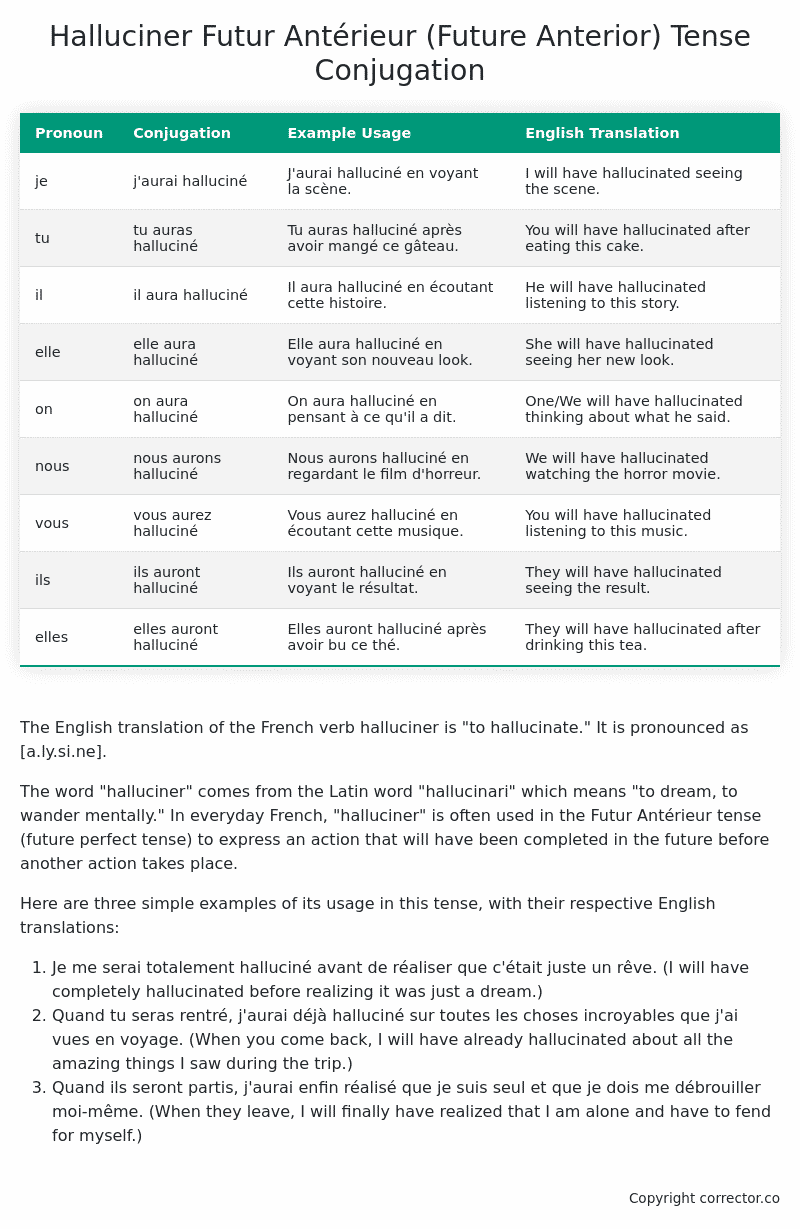Futur Antérieur (Future Anterior) Tense Conjugation of the French Verb halluciner
Introduction to the verb halluciner
The English translation of the French verb halluciner is “to hallucinate.” It is pronounced as [a.ly.si.ne].
The word “halluciner” comes from the Latin word “hallucinari” which means “to dream, to wander mentally.” In everyday French, “halluciner” is often used in the Futur Antérieur tense (future perfect tense) to express an action that will have been completed in the future before another action takes place.
Here are three simple examples of its usage in this tense, with their respective English translations:
- Je me serai totalement halluciné avant de réaliser que c’était juste un rêve. (I will have completely hallucinated before realizing it was just a dream.)
- Quand tu seras rentré, j’aurai déjà halluciné sur toutes les choses incroyables que j’ai vues en voyage. (When you come back, I will have already hallucinated about all the amazing things I saw during the trip.)
- Quand ils seront partis, j’aurai enfin réalisé que je suis seul et que je dois me débrouiller moi-même. (When they leave, I will finally have realized that I am alone and have to fend for myself.)
Table of the Futur Antérieur (Future Anterior) Tense Conjugation of halluciner
| Pronoun | Conjugation | Example Usage | English Translation |
|---|---|---|---|
| je | j’aurai halluciné | J’aurai halluciné en voyant la scène. | I will have hallucinated seeing the scene. |
| tu | tu auras halluciné | Tu auras halluciné après avoir mangé ce gâteau. | You will have hallucinated after eating this cake. |
| il | il aura halluciné | Il aura halluciné en écoutant cette histoire. | He will have hallucinated listening to this story. |
| elle | elle aura halluciné | Elle aura halluciné en voyant son nouveau look. | She will have hallucinated seeing her new look. |
| on | on aura halluciné | On aura halluciné en pensant à ce qu’il a dit. | One/We will have hallucinated thinking about what he said. |
| nous | nous aurons halluciné | Nous aurons halluciné en regardant le film d’horreur. | We will have hallucinated watching the horror movie. |
| vous | vous aurez halluciné | Vous aurez halluciné en écoutant cette musique. | You will have hallucinated listening to this music. |
| ils | ils auront halluciné | Ils auront halluciné en voyant le résultat. | They will have hallucinated seeing the result. |
| elles | elles auront halluciné | Elles auront halluciné après avoir bu ce thé. | They will have hallucinated after drinking this tea. |
Other Conjugations for Halluciner.
Le Present (Present Tense) Conjugation of the French Verb halluciner
Imparfait (Imperfect) Tense Conjugation of the French Verb halluciner
Passé Simple (Simple Past) Tense Conjugation of the French Verb halluciner
Passé Composé (Present Perfect) Tense Conjugation of the French Verb halluciner
Futur Simple (Simple Future) Tense Conjugation of the French Verb halluciner
Futur Proche (Near Future) Tense Conjugation of the French Verb halluciner
Plus-que-parfait (Pluperfect) Tense Conjugation of the French Verb halluciner
Passé Antérieur (Past Anterior) Tense Conjugation of the French Verb halluciner
Futur Antérieur (Future Anterior) Tense Conjugation of the French Verb halluciner (this article)
Subjonctif Présent (Subjunctive Present) Tense Conjugation of the French Verb halluciner
Subjonctif Passé (Subjunctive Past) Tense Conjugation of the French Verb halluciner
Subjonctif Imparfait (Subjunctive Imperfect) Tense Conjugation of the French Verb halluciner
Subjonctif Plus-que-parfait (Subjunctive Pluperfect) Tense Conjugation of the French Verb halluciner
Conditionnel Présent (Conditional Present) Tense Conjugation of the French Verb halluciner
Conditionnel Passé (Conditional Past) Tense Conjugation of the French Verb halluciner
L’impératif Présent (Imperative Present) Tense Conjugation of the French Verb halluciner
L’infinitif Présent (Infinitive Present) Tense Conjugation of the French Verb halluciner
Struggling with French verbs or the language in general? Why not use our free French Grammar Checker – no registration required!
Get a FREE Download Study Sheet of this Conjugation 🔥
Simply right click the image below, click “save image” and get your free reference for the halluciner Futur Antérieur tense conjugation!

Halluciner – About the French Futur Antérieur (Future Anterior) Tense
Construction
Common Everyday Usage Patterns
Interactions with Other Tenses
For example
Summary
I hope you enjoyed this article on the verb halluciner. Still in a learning mood? Check out another TOTALLY random French verb conjugation!


